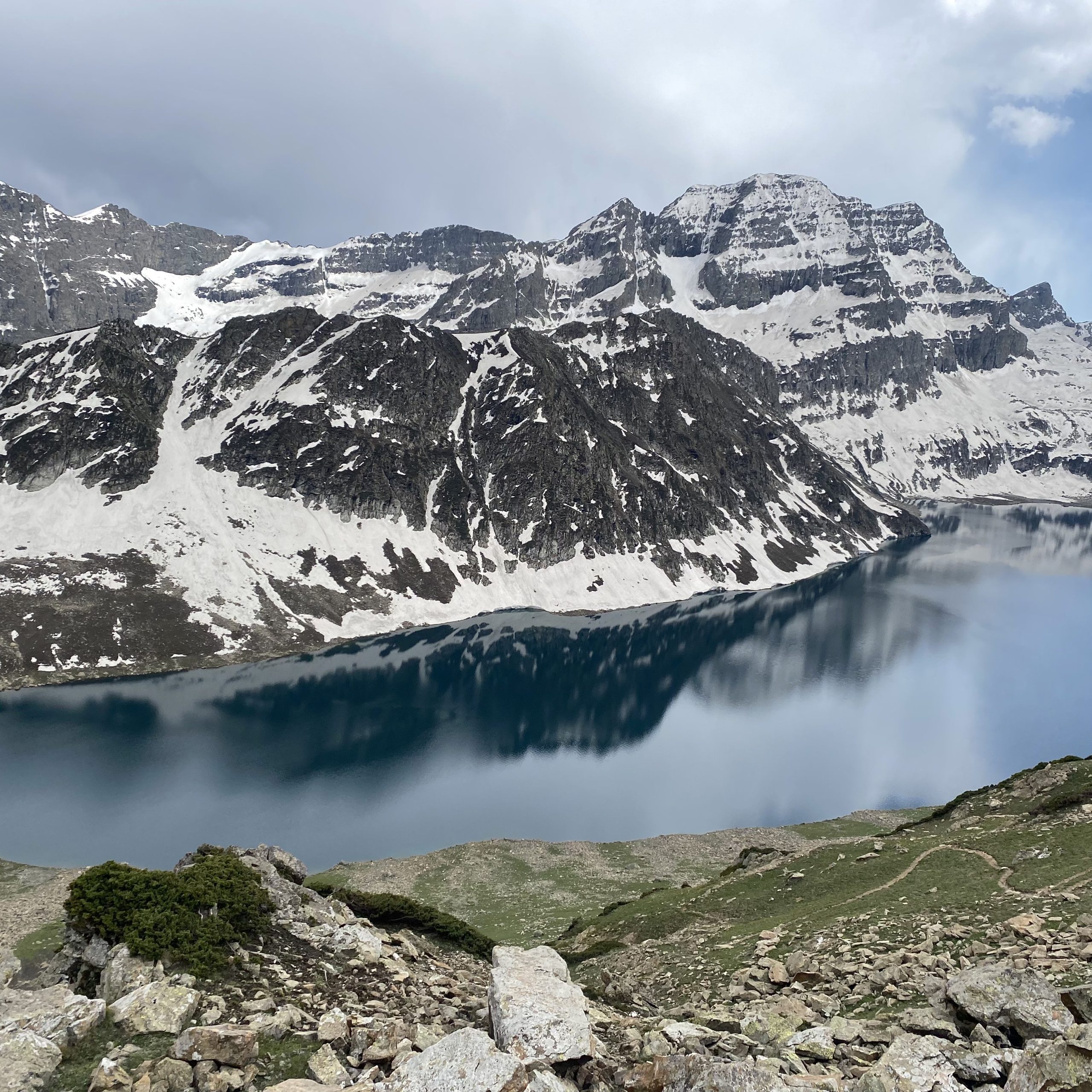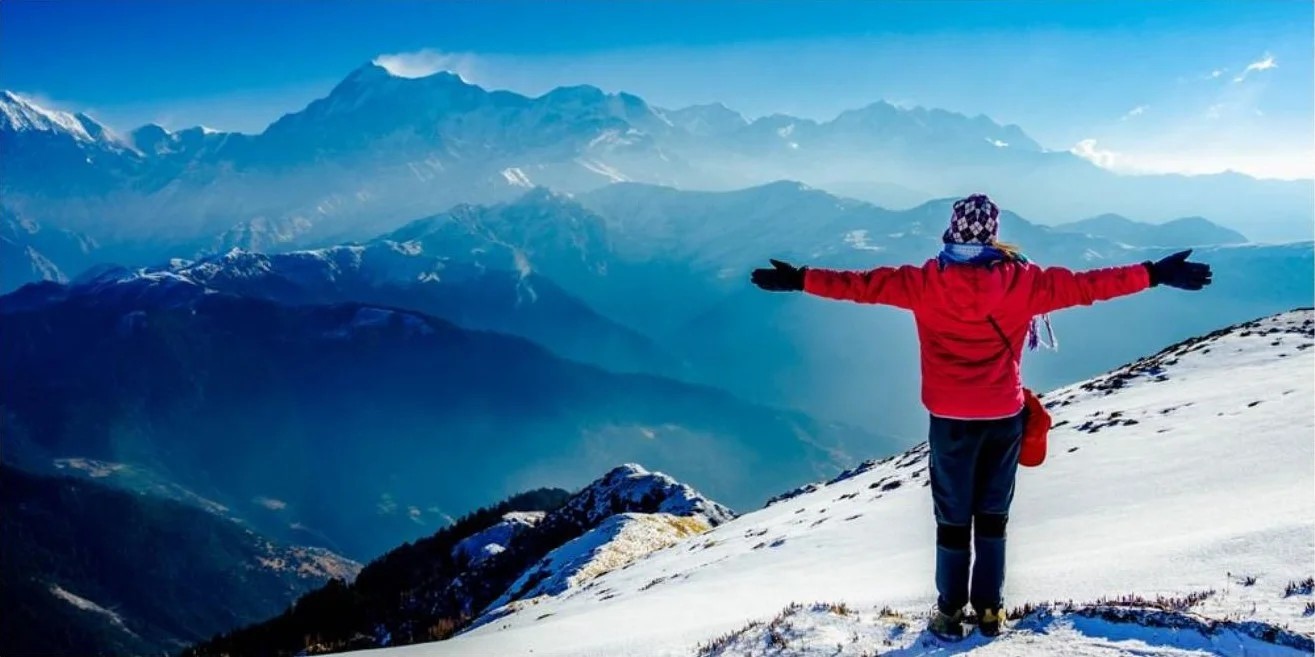11 Best Monsoon Treks in the India : Trekking Cougars
Monsoon trekking in the Indian Himalayas is not just about getting drenched in the rain — it’s an invitation to experience nature in its rawest, most ethereal form. Imagine walking through clouds that wrap around your path like a soft curtain, listening to the rhythmic music of raindrops dancing on thick canopies of oak and deodar trees, and watching vibrant meadows come alive with a riot of wildflowers after every shower.
The trails are transformed into lush green wonderlands, mist floats above silent valleys, and hidden waterfalls roar with renewed life. Every step taken during the monsoon becomes a brushstroke on the canvas of a dreamlike landscape. Whether you’re a passionate nature lover, an adventure seeker, or a photographer hunting for that perfect misty frame — the Indian Himalayas offer a monsoon trekking experience unlike any other.
Best Monsoon Treks are mentioned below :
1. Kedarkantha Trek
Why it’s Popular: Known for snow trails in winter, Kedarkantha turns into a lush monsoon wonderland with pine forests and misty meadows.
- Best Time: July to early September
- Start Point: Sankri, Uttarakhand
- Duration: 5–6 days
- Length: ~20 km
- Max Altitude: 12,500 ft
Pros:
- Beginner-friendly
- Panoramic views of Swargarohini
Cons:
- Slippery during rain
- Reduced visibility in fog
Essentials: Raincoat/poncho, warm base layers, quick-dry clothes
Inclusions: Camping gear, meals, permits, experienced trek leader
Exclusions: Travel to Sankri, personal gear, tips
Safety: Avoid solo hikes in fog; watch for slippery patches and leeches.
2. Minkiani Pass Trek
Why it’s Popular: A remote and adventurous trail in Himachal that offers lakes, wildflowers, and raw beauty of the Dhauladhars.
- Best Time: Mid-July to September
- Start Point: Kareri Village, Himachal Pradesh
- Duration: 5 days
- Length: ~25 km
- Max Altitude: 14,100 ft
Pros:
- Offbeat, less crowded
- Alpine lake camping
Cons:
- Requires high stamina
- No network, remote trail
Essentials: Waterproof trekking shoes, gaiters, power bank
Inclusions: Tent, food, certified mountain guide
Exclusions: Travel from hometown, porter, rentals
Safety: Always trek in groups; check weather before the summit day.
3. Brahmatal Lake Trek
Why it’s Popular: Known for its enchanting lake and forest cover, Brahmatal becomes a green paradise in monsoon.
- Best Time: July to August
- Start Point: Lohajung, Uttarakhand
- Duration: 5–6 days
- Length: ~24 km
- Max Altitude: 12,250 ft
Pros:
- Serene lake views
- Rich biodiversity
Cons:
- Foggy conditions
- Slippery terrain
Essentials: Rain cover for backpack, insect repellent, warm socks
Inclusions: Meals, sleeping bags, dome tents
Exclusions: Lohajung transport, personal insurance
Safety: Stay with the group; avoid camping near cliffs or ledges.
4. Nag Tibba Trek
Why it’s Popular: A beginner’s paradise near Mussoorie with gentle slopes, forested paths, and peak views.
- Best Time: July to September
- Start Point: Pantwari, Uttarakhand
- Duration: 2–3 days
- Length: ~16 km
- Max Altitude: 9,910 ft
Pros:
- Ideal for first-time trekkers
- Accessible weekend trek
Cons:
- Less alpine views
- Muddy during downpours
Essentials: Headlamp, trekking pole, rain gear
Inclusions: Meals, homestay/camping, local guide
Exclusions: Transport from Mussoorie, personal snacks
Safety: Begin early to avoid late afternoon thunderstorms.
5. Chopta–Tungnath Trek
Why it’s Popular: Home to the world’s highest Shiva temple, with green pastures and spiritual energy enhanced by monsoon mist.
- Best Time: July to September
- Start Point: Chopta, Uttarakhand
- Duration: 3–4 days
- Length: ~12 km
- Max Altitude: 12,100 ft
Pros:
- Sacred and scenic
- Easy ascent
Cons:
- Frequent landslides on approach roads
- Cloud cover at summit
Essentials: Warm base layers, water-resistant shoes, ID proof
Inclusions: All meals, temple visit assistance, trek leader
Exclusions: Donations, mule services, personal medication
Safety: Follow weather bulletins; avoid night travel to Chopta.
6. Bhrigu Lake Trek
Why it’s Popular: A short high-altitude trail near Manali offering beautiful alpine lake scenes and lush meadows.
- Best Time: Late June to mid-August
- Start Point: Gulaba, Himachal Pradesh
- Duration: 3–4 days
- Length: ~22 km
- Max Altitude: 14,100 ft
Pros:
- Short yet rewarding
- Alpine meadows
Cons:
- Sudden storms
- Gets chilly
Essentials: Layered clothing, energy bars, daypack
Inclusions: Tent, food, guide, basic medical kit
Exclusions: Manali transfers, extra baggage fees
Safety: Cross streams early; avoid standing near lake during lightning.
7. Tarsar Marsar Trek
Why it’s Popular: This Kashmir gem has twin lakes, flowery pastures, and dramatic landscapes that come alive in monsoon.
- Best Time: July to September
- Start Point: Aru, Pahalgam
- Duration: 7 days
- Length: ~47 km
- Max Altitude: 13,200 ft
Pros:
- Pristine valleys
- Photogenic terrain
Cons:
- Permits may be restricted
- Remote access
Essentials: Sunscreen, warm fleece, biodegradable soap
Inclusions: Permits, tented stay, cook, guide
Exclusions: Flights to Srinagar, political travel insurance
Safety: Avoid politically unstable regions; inform someone back home.
8. Valley of Flowers Trek
Why it’s Popular: A UNESCO World Heritage site, this trail is a dream for botanists and photographers.
- Best Time: Mid-July to August
- Start Point: Govindghat, Uttarakhand
- Duration: 6–7 days
- Length: ~38 km
- Max Altitude: 14,100 ft
Pros:
- Stunning biodiversity
- Well-marked trail
Cons:
- No camping inside the park
- Moderate difficulty
Essentials: Gaiters, camera, trekking boots
Inclusions: Lodge stay, entry fees, vegetarian meals
Exclusions: Ponies, Govindghat taxi fare
Safety: Stick to trails; respect park timings and rules.
9. Bali Pass Trek
Why it’s Popular: A hardcore trek that takes you across glaciers, river crossings, and ancient routes.
- Best Time: Mid-July to September
- Start Point: Sankri, Uttarakhand
- Duration: 8–9 days
- Length: ~60 km
- Max Altitude: 16,200 ft
Pros:
- Wild, untouched route
- Massive altitude gain
Cons:
- Technical difficulty
- Cold nights and thin air
Essentials: Dry fruits, trek shoes with ankle support, blister kit
Inclusions: Porters, tents, food, expert guide
Exclusions: Travel insurance, trek gear
Safety: Must be well-acclimatized; follow guide instructions strictly.
10. Kareri Lake Trek
Why it’s Popular: A moderate weekend trek near Dharamshala leading to a glacial lake surrounded by pine forests.
- Best Time: July to early September
- Start Point: Kareri Village, Himachal Pradesh
- Duration: 2–3 days
- Length: ~26 km
- Max Altitude: 9,700 ft
Pros:
- Quick access from Dharamshala
- Scenic lake
Cons:
- Can get crowded on weekends
- Cold wind at night
Essentials: Poncho, water bottle, snacks
Inclusions: Campsite, cooked food, forest permits
Exclusions: Dharamshala transfers, personal gear
Safety: Avoid camping near overflowing streams.
11. Hampta Pass Trek
Why it’s Popular: This dramatic crossover trek links the lush Kullu valley to the stark Spiti valley.
- Best Time: July to September
- Start Point: Jobra, near Manali
- Duration: 5–6 days
- Length: ~35 km
- Max Altitude: 14,000 ft
Pros:
- Contrasting landscapes
- Moderate level trek
Cons:
- Risky water crossings
- Harsh wind at pass
Essentials: Quick-dry clothes, gloves, gaiters
Inclusions: Meals, tent, experienced support staff
Exclusions: Backpack offloading, Manali stay
Safety: Cross rivers with guide only; secure belongings from water.
Conclusion
Whether you’re after solitude, wildflowers, spiritual vibes, or raw adventure, monsoon treks in the Himalayas offer it all. With careful planning and the right gear, each of these treks can become a once-in-a-lifetime experience. Choose your trail and let the rains guide you into the heart of Himalayan beauty.





